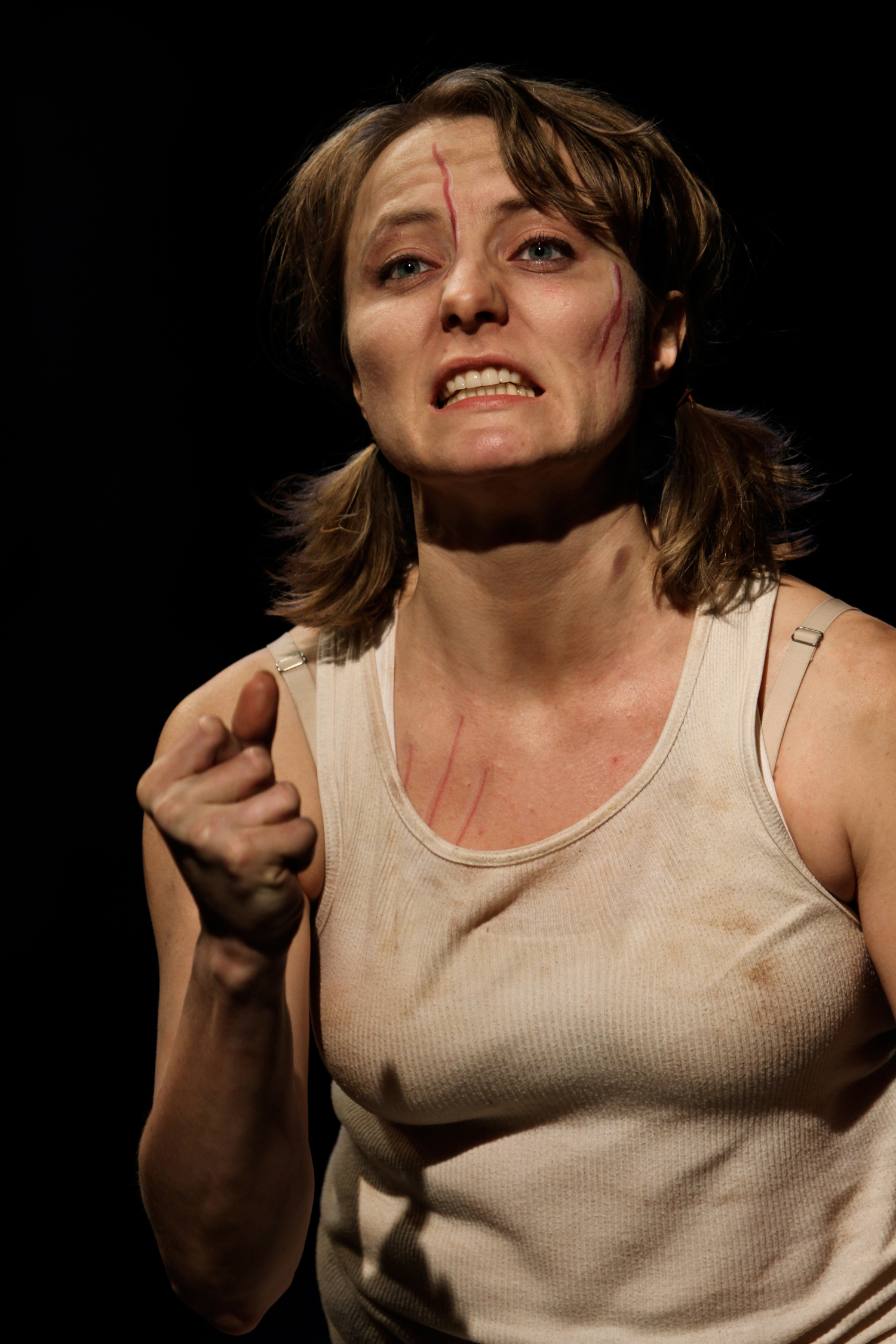Electra is a troubled and troublesome lass. Stuck in second gear in the grief cycle (anger) over the long-past murder of her father, she’s still jonesing for revenge. We are expected to relish her journey toward inevitable bloodshed as much as she does, but Seattle Shakespeare’s restrained take on Sophocles’ ancient tragedy withholds such direct, easy gratification.
Plays from Sophocles’ classical Greek era (the fifth century B.C.) are meant to be delivered straight—not so much acted as demonstrated. The challenge here for director Sheila Daniels is to reach audiences accustomed to subtext, depth of character, and motives we can somehow find relatable and “modern.” Her efforts aren’t entirely successful.
Entering the theater, you encounter a tableau vivant—a kneeling woman, who turns out to be Electra herself, riveted to a grainy old black-and-white video. She’s stuck in the past—and on her father (hence Freud’s Electra complex).
Inside, Andrea Bryn Bush’s set juxtaposes artifacts of the ancient world (sacrificial bowls, tunics, colossal columns) with modern military trappings (combat boots, fatigues, chain-link fences). A desolate wind blows faintly in our ears; sun bakes what looks like postwar rubble. The main characters deliver Frank McGuinness’ luscious but still speech-heavy adaptation to other characters who stand around listening like survivors of the apocalypse.
Foremost among the speakers is Marya Sea Kaminski’s eerily childlike Electra, obsessed with her slain father Agamemnon and blaming her mother, Clytemnestra (Ellen Boyle), for his murder. Smeared with dirt, hair in ponytails, swathed in multilayered slacker duds, Kaminski pouts, petulantly drums on her thighs, and rolls her green feline eyes when spoken to. She frequently toggles those eyes between an ordinary gaze and a freaky zombie stare—as if Electra’s dead-daddy fixation has removed her from human kinship.
I’m not sure if this was intended, but this Electra reminded me of the similarly naïve/depraved Lynndie England, the smiling soldier in those notorious Abu Ghraib photos. The military association is reinforced by the crew-cut look of her brother, Orestes (Darragh Kennan), who joins her revenge plot against their mother.
They’re an unlikely pair of schemers (or siblings, for that matter). Electra is always on, always urgent as she swings from gleeful to bilious to agonized. Warrior Orestes, returned from exile, is mostly cool, like a desensitized video gamer on a rote mission. It’s not the juiciest or most viscerally gratifying interpretation of his role, but maybe that’s the way wars are fought today.
But as with war, we must ask of a revenge killing: Is this cause just? Electra has several layers of built-in moral ambiguity. First, Clytemnestra may have been somewhat justified in killing her husband, who had taken a wartime concubine. Second, Agamemnon had sacrificed of one of their daughters, Iphigenia, to satisfy an oracle. So Clytemnestra had her reasons, which Electra essentially ignores.
Instead of elucidating those core issues, this Electra signals its differing characters through their costumes. Clytemnestra and her lover Aegisthus are dressed for a night on the town in Vegas. Orestes’ posse resembles soldiers on leave. And the three-woman chorus is attired as a nurse, a debutante, and a nymph. It’s bizarre—but so was the ancient Greek stage tradition of masks.
In the end, Daniels’ execution of the play, like the pale desert in which she sets it, feels parched. Even the gory payoff is repressed—staged on the floor and hard to see if you’re seated behind a tall person. Afterward, hyperventilating with the thrill of their revenge, Electra and her brother get what they want. As for me, I’d be lying if I didn’t admit to wanting more clobber-you-over-the-head effects throughout—screaming violins or a deafening drumbeat or something to stir Sophocles’ old blood.








